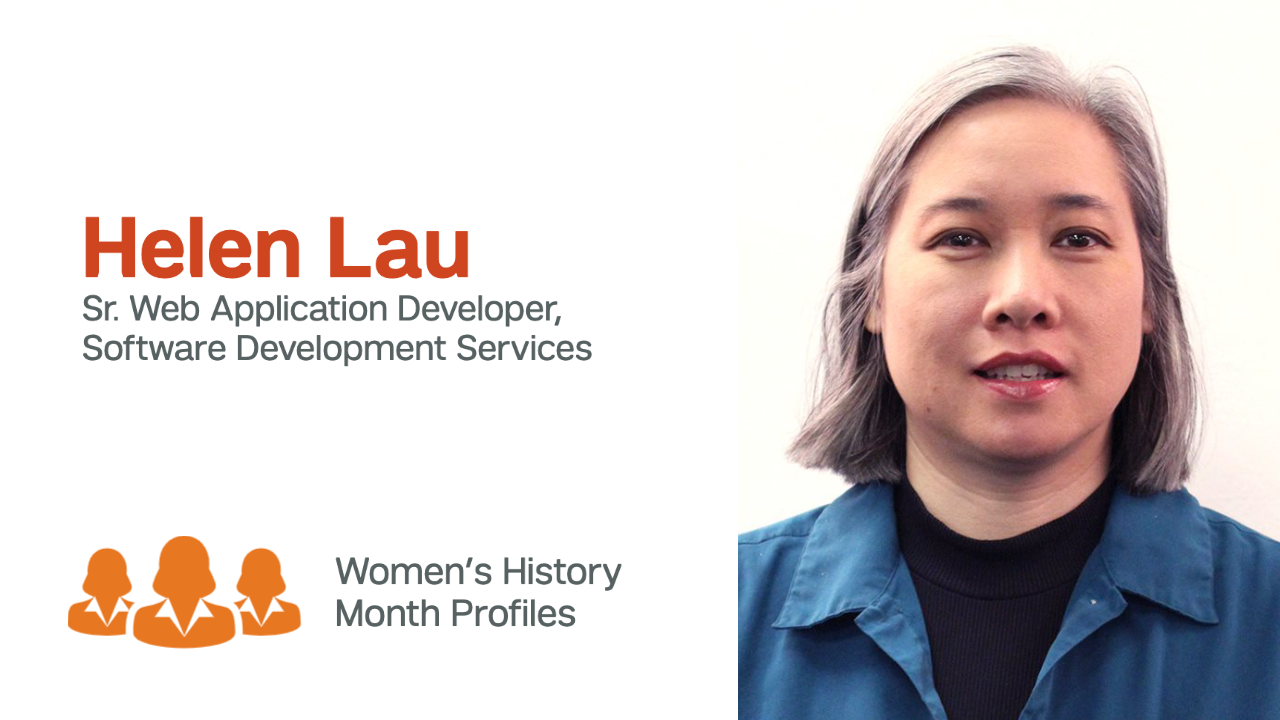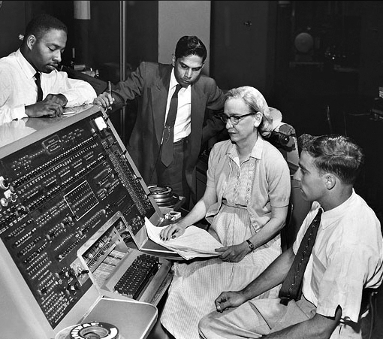
Helen Lau, Senior Web Application Developer, has been coding since high school, and majored in Computer Science when it was still a developing field. She puts her deep knowledge of programming to use today on the ServiceNow development team, where she helps configure the platform's applications to improve business functions at WCM.
I am a Senior Web Application Developer on the ServiceNow development team. My role is to help support, configure and enhance various ServiceNow applications as well as create additional functionality on the ServiceNow platform to meet business needs. Many of the ServiceNow applications in use today are for ITSM or ITBM, so most often I am working on IT-related ServiceNow applications.
Working with the ServiceNow development team has been a rewarding experience. It has taught me the value of working as part of a team. Seeing other people’s perspectives and ideas helps me to keep an open mind and learn new ideas.
About 13 years; I started working here in 2008.
Initially, I was hired as a Web Application Developer to work on Weill Cornell’s ColdFusion-based websites. ColdFusion is an older web scripting language that isn’t used much anymore. After several years, the college licensed the ServiceNow cloud-based platform and some of its applications, and I was chosen to be part of an IT team to assist with its initial deployment of the Incident and Project Management applications. I have been working on the ServiceNow platform ever since.
Before WCM, I was working as a Web Developer at a private company, Carcogroup. Before that, I worked at another company developing CD-ROM based applications
I received my Bachelor’s in Computer Science from Colgate University. Back then, the Computer Science department was very small. When I graduated, I was among 14 people who majored in Computer Science. It was a new department, with several computer professors who had been professors in other areas like Chemistry and Mathematics.
In high school, I had taken a programming course, and was interested in writing code. During my freshman year at college, I signed up for mostly science courses and found that I enjoyed my computer science classes the most. I must confess, I also did not do as well in my Physics and Abstract Algebra classes.
One of the recent successful initiatives I have been working on with the ServiceNow development team has been task flattening, which relates to the ServiceNow task table database structure. In 2019 there were some technical blockers that prevented us from converting our ServiceNow task table structure to an improved design. However, last year, some of the technical blockers were resolved, and the team spent the last several months working with ServiceNow support team through migration and testing, so now our ServiceNow task table structure is updated with the optimal design. This work allows us to scale our task table usage as we continue to release more applications and functionality to the business. If this effort was not successful, one alternative would have been to move all our applications and data to a new ServiceNow instance, which would have been a very complex under-taking.
Although it is in the early stages, the IT Asset Management project, will be an exciting project, because it will help streamline IT team’s asset workflows. Instead of managing items through emails, Excel files and separate applications, the ServiceNow Asset application will be a central place to manage all assets through their financial and contractual lifecycle. It will also increase transparency and allow asset data to be linked to configuration items and other data in ServiceNow.
ServiceNow has greatly increased its offering of applications, and features since we started in December 2012. There are plenty of other features, such Virtual Agent, and Machine Learning as well as integrations with SAP, Microsoft Azure, and others, that we can utilize to meet future business needs. A critical part is for our team to stay focused on out-of-the-box functionality. If we limit customizations to important business customizations and remove less valued customizations, our ServiceNow instance will remain close to out-of-the-box functionality, which allows us to configure and deploy new applications and features for the business more quickly.
It has been very challenging. For me it's been about maintaining boundaries between personal time and work time. Work tends to bleed over into my personal time. I often find myself spending an extra hour or two after work and on weekends. There's always more work to do. I've been slowly ratcheting it back, but I think it's been hard for me to let go. It’s been challenging to carve out personal time for myself.
OK that makes me feel better. If you’re working from home, you feel like you’re not sharing that with everyone, like “Hey, you know I've just been working and working and working."
It's hard making the mental separation
I’m trying to carve out more personal time. Though I don’t stop at five o’clock, I’m learning to take short breaks, maybe five or ten minutes here and there, and I’m beginning to take walks now that the weather is better. I'm also trying to do more mindfulness meditation; I think that does help me reduce some of the stress.
I’ve been taking a few casual online classes like “Masterclass Sara Blakely Teaches Self-Made Entrepreneurship”. She provides a lot of practical advice like “always sell the problem, not the solution. People are emotionally attached to the problem, so first describe the problem, and then offer the solution”.
Another casual online class I took was “Masterclass Chris Voss Teaches the Art of Negotiation”. An interesting quote from this class is “True negotiation is a collaboration where a set of people facing different aspects of the same problem that must be resolved.”
My favorite part of my job is collaborating with other people and writing code. I’ve been working a long time with the ServiceNow development team, and I have a lot of respect for their work and professionalism. When I am in meetings with various IT staff, I am consistently impressed with their knowledge, and try to learn from the experience.
Grace Hopper. She’s one of the early pioneers of Computer Science. She was a professor of mathematics at Vassar College. During World War II she was rejected from the Navy because she was 34 years old, so she joined the Navy Reserves; in 1985, she achieved the rank of rear admiral and was among the Navy’s few female admirals. In 1952, she helped create the first compiler for computer languages. In 1955, she also helped design one of the first programming languages, FLOW-MATIC, whose design was later partly used to design COBOL. In 1951, she was part of the team that helped develop the UNIVAC computer, the first commercially produced, all-electronic digital computer.

Grace Hopper at the UNIVAC console (1960. Source: Wikipedia)
That's a tough one because I feel a bit overworked right now. I’ve been reconnecting with some college friends I haven’t seen in years. Now the weather is warmer, I’ve been going for daily walks. I know it's a bad answer...